![[Crunchyroll promo image]](/images/reviews/mushishizokubox.jpg) |
| AKA: N/A |
| Genre: Mythology, Folklore, Supernatural |
| Length: Television series, 22 episodes, 24 minutes each |
| Distributor: Currently licensed by FUNimation, but also streaming on Crunchyroll. |
| Content Rating: 13+ (Mature Themes, Some Violence, Disturbing Imagery) |
| Related Series: Mushishi (Prequel), Mushishi Special: Hihamukage (Side Story), Mushishi Film (Upcoming Sequel) |
| Also Recommended: Natsume's Book of Friends, Kino's Journey |
Notes: Based on the manga by Yuki Urushibara; this essentially picks up adapting the manga from where the first season left off, given that the staff involved are almost all the same between that one and this one.
This “new season” aired as two separate cours, one in Spring and one in Winter 2014, and a 40-minute special that essentially was two extra episodes joined together aired in Summer 2014. All of these anime are covered in this review under the banner of “Mushishi: The Next Chapter," although MyAnimeList gives them three separate entries. |
Rating:      |
Mushi-Shi: The Next Chapter
Synopsis
Mushi are strange creatures that are neither plants or animals; unseen to most humans, they nonetheless subtly influence the environment around them. Ginko is a mushi expert or mushi-shi, one of the few humans who can see them; he travels the world studying them and occasionally assisting those who have been affected by imbalances or instabilities in the world of mushi. Yet since he himself attracts them with his presence, he can never remain in one place for very long...
Review
Nico: If I'd had to bet that an older series would get a sequel out of nowhere, then as much as I hate to say it, Mushi-Shi probably wouldn't have been my pick, as good a show as it was. While I can possibly picture the mushi themselves becoming a line of plushies (if you can turn viruses and Anomalocaris into stuffed animals, then anything is possible), it's not a series that ever had much merchandising potential, and it's a slow and quiet series that rewards the patient viewer rather than serving up much in the way of hooks. Whoever's persistence it was that, almost a decade after the original aired, gave us a special, a new TV series, and a movie finale within a single year, be it that of director Hiroshi Nagahama, mangaka Yuki Urushibara, or someone far more anonymous, there's one thing I'm sure of: I'm happy to have so much new Mushi-Shi all at once.
Stig: The first Mushi-Shi was a Reverse Secret Santa pick for me, and the fact that I returned for this one should say it all. Not that I'm a stranger of perhaps needlessly following up on terrible shows too, but make a show of this quality readily and easily available, and I'll watch it, no problem. Also, while I didn't necessarily expect a sequel of this show, its presence doesn't really surprise me either. Mushi-Shi has shown itself as a franchise that managed to stand out among its peers by its sheer wealth of pseudo-biological novelty alone, and shows like that might draw an audience that raises the possibility of a sequel. Mushi-Shi has certainly earned its sequel, there's no question about that.
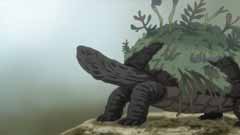 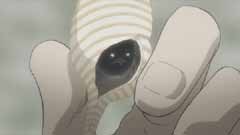
Now, it's very tempting to see this season of Mushi-Shi as a throwback to a series from another era; whereas some reboots may try hard (and sometimes try too hard) to "recreate" the feel of their predecessor, The Next Chapter has the benefit of coming from the same studio and the same director, and of picking up basically where the first season left off in adapting its source manga. Much of what Stig had to say about the art and animation in regards to the first season remains true here: there's the occasional issue of human characters looking too similar, but the mushi themselves, when visible, are like an array of otherworldy creatures out of a modern-day Ediacaran biota and endlessly fascinating and mysterious in their lifecycles and strange interactions with the human world, with the scenery being absolutely lovely to boot. Much of the idiophone-rich, electronics-tinged soundtrack of the original is preserved here, too, although we do have a new opening theme: the soft, spine-tingling song "Shiver" from English singer Lucy Rose, which made both of us, well, shiver aplenty... in a good way. (I'm NOT taking credit for that pun. -Stig.)
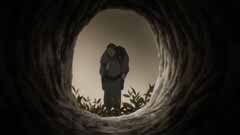 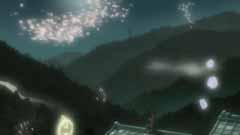
But Mushi-Shi: The Next Chapter does in fact accomplish one thing that its predecessor didn't. This time around, the human drama is much, much more compelling, and since this was frequently one of the weakest (or at least most uneven) aspects of the first series, this iteration of Mushi-Shi is actually somewhat stronger. Ginko remains his wry but compassionate self, his occasional snarky asides giving the show just the right amount of humor. He has several strong episodes centered largely on himself, one of the best being "Depths of Winter," in which he finds himself sealed on a mountain by its lord during a winter storm; we were briefly introduced to these creatures, animals entrusted with the guardianship of a single mountain, in the first season, and this episode fleshes out the fact that he has something resembling a personal relationship with them and that their personalities often differ rather strongly, as it's clear that this one is somewhat mischievous. It's "Cushion of Grass," however, that fills in the gap between the rather nervous and fearful child version of Ginko we briefly saw via flashback in the first season, in which he still somewhat resented the mushi that had so taken over his existence, and the version we know and love, in which he has much more affection and appreciation of them; the experience depicted in there is heartbreaking, honestly, but it works wonders.
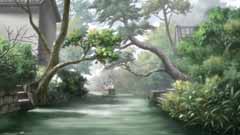 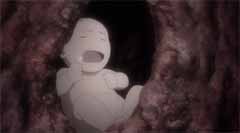 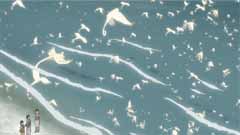
Nico: It was really the one-off episodes that showed the most improvement in regards to the writing, though, and I'd guess that much of it has to do with the mangaka's evolving and maturing writing style as her work went along. For the first time, I found myself just about as interested in the people as I was in the mushi entwined with their lives. The first episode, "Banquet at the Forest's Edge," in which a sake brewer's son tries to recreate the brew that once made his father so famous and unknowingly infiltrates a sort of mushi gathering in the process, sets the tone for this in having a given character's connection to the mushi be compelling, in being so effectively tied to a character's affection for his late father, without Ginko being front and center, something that the first season often struggled with. One of my favorites was "Hidden Cove," in which the fog covering a town built on canals emphasizes the isolation and loneliness brought about when a self-centered man tries to separate his daughter from her (female) lover, the repeated imagery of canals tying in with the episode's focus on a mushi that opens up a mental connection between the two (I'll also give the episode kudos for having a same-sex relationship end happily). Another episode that I liked was "Lightning's End," in which a mother is convinced that her son, whom she bore to a man she never loved and has thus never felt affection for, is attracting lightning to the town to spite her; it's a rather bittersweet episode in that while the son isn't really to blame for anything, the mother is written as somebody who you can't really hate, either, given that the show frames her condition as something forced on her.
Stig: For me, Mushi-Shi has always been at its best when dedicating itself fully to its biological aspects; where the Mushi are a perfectly natural, if also somewhat supernatural, addition to the biological spectrum already existing in the world this show takes place in, and how it interacts with all life around it, human or not. As much as I do like me a history lesson in this show too, I could also easily fall in love with the sheer simplicity of "The Warbling Sea Shell," where tiny, bird-shaped mushi are sensitive to coming disasters and seek shelter in sea shells... by the shore. (Try saying that ten times fast.) Or "Wind Raiser," which told the story about a young man who could call upon other bird-like mushi. I also like the aforementioned episode about the mountain God that took the form of a turtle, though that might be the fetishist in me who gets all shiver-y inside when presented with an excellently made snow-covered pastoral. That said, the fact that, as we mentioned, side characters are being fleshed out a lot more than in the first season also makes episodes about the mushi's direct interaction with human beings a lot more palatable, on average being like the strongest episodes of the first season. The OAV, which Nic reviewed earlier, was particularly strong in this aspect, but this TV season is certainly no slouch either. If I were to make one nitpick about this show, then that would be that I didn't always appreciate the more ridiculous abilities of some of the mushi. I could possibly maybe buy that there is a secret Mushi society, and I didn't have a problem with a lot of the crazier abilities or side effects that interaction with the mushi would bring, but the episode named "Fragrant Darkness" somehow managed to bring time travel into the equation, where a man would continuously relive his life from a young boy up until relatively old age, which would be reset each time he entered a cave where a particular type of mushi lives. That was one episode that stretched my sense of disbelief maybe a little bit too far.
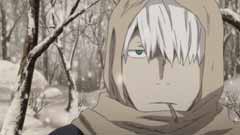 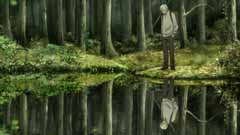 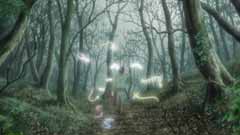
Really, though, if there's something to be said about Mushi-Shi: The Next Chapter, it's that the percentage of episodes that left either of us cold was far, far lower than the first season. The writing is more subtle, and there's simply a much greater variety of stories and more episodes that don't use Ginko and his personality as a crutch to carry the story. As much as both of us appreciated Ginko during the first season, it's rather nice to see the mangaka be able to develop interesting characters (and with relatively little info-dumping) during much shorter periods of time, which is crucial for such an episodic series, and to expand the variety of stories possible. Many of the episodes still constitute situations in which the presence of wayward mushi, or just an imbalance in their numbers, is a life-or-death situation, but the episodes tend to involve less yelling, melodrama, and cases of closed-minded villagers acting generically provincial, and more contemplation, tending to be far more bittersweet overall. It's amazing what improved character writing can do.
Stig: As you can probably tell, I am just about as enthusiastic about this show as Nico is, and, my little nitpick aside, The Next Chapter stepped up its game enough that I'm certainly not going to argue the five star rating. Maybe it's because, despite "Shiver" being a sadder and more melancholy song, The Next Story's overall tone is a good bit lighter than its more tragedy-prone first season.
Nico: Just as its opening theme describes, Mushi-Shi: The Next Chapter often simply made me shiver. My favorite series rarely ever seem to be the type that readily get sequel adaptations, and rarely does the sequel improve as much as this one does. To whoever made it possible for this show to be made, I will say: thank you. Having more Mushi-Shi just about made my year, anime-wise.
As green, as pretty, and as atmospherically effective as the first season, but much more compelling, plot-wise. — Stig Høgset and Nicole MacLean
Recommended Audience: There actually aren't very many things that make us think that kids shouldn't watch this, but the show doesn't gloss over the emotional neglect some characters experience, and there's enough bloodshed in a handful of episodes to make us pause.
Version(s) Viewed: Digital stream on Crunchyroll, Japanese with English subs.
Review Status: Full (22/22)
Mushi-Shi: The Next Chapter © 2014 Yuki Urushibara/KODANSHA/Aniplex Inc.
|




